The Netherlands’ hopes of qualifying automatically for Euro 2016 were ended by a heavy defeat in Turkey.
Midfielder Oguzhan Ozyakup raced on to an Arda Turan through ball to put the home side ahead with a chipped finish.
Turan doubled the lead by stealing the ball from a dithering Daley Blind before firing past the weak hands of Jasper Cillessen at the near post.
Burak Yilmaz added a third late on to seal a result that means the Dutch can only finish third in Group A.
But to achieve that the Netherlands must now rely on Turkey dropping points in their last two games.
Iceland confirmed their place at an international tournament for the first time when they secured the point they needed against Kazakhstan. The Czech Republic also qualified automatically after beating Latvia 2-1.
Whoever finishes behind the top two will be guaranteed a place in a two-legged play-off against another of the third-placed sides.
That is the only path open to the Dutch, but their fate is now out of their own hands after Turkey leapfrogged them with a convincing win.
It was the Netherlands’ heaviest competitive defeat since 1996, when they lost 4-1 to England at Wembley in Euro ’96.
“This whole qualification campaign has been incredibly difficult,” said striker Robin van Persie. “We still have a chance, but it is no longer in our hands and that is terrible.”
Belgium narrowly defeated Cyprus in Nicosia to keep Group B leaders Wales waiting to qualify for Euro 2016.
The Welsh drew 0-0 with Israel in Cardiff and would have qualified if Belgium had failed to win.
But Chelsea forward Eden Hazard hit the winner four minutes from time, stroking in Dries Mertens’s cutback.
Earlier, midfielder Kevin De Bruyne had struck straight at the goalkeeper when through on goal and Marios Nikolaou had a low effort saved by Thibaut Courtois.
In the same group, Bosnia-Herzegovina beat Andorra 3-0 to move up to fourth, two points behind Israel.
Wales need a draw away at Bosnia-Herzegovina or at home against Andorra to secure qualification, while Belgium also have a chance to qualify automatically when they face Andorra and Israel in their last two matches.
Second-placed Belgium are one point behind Wales, with the top two sides securing automatic qualification for the tournament in France next summer.
New Delhi, Sep 5 (PTI) The best paragliders in the world will gather in Bir Billing and show their mettle, as India gear up to host the “AAI Paragliding World Cup 2015”.
Preparations are underway on a massive scale in Bir Billing in Himachal Pradesh, where the World Cup would be staged from October 23?31 2015.
The Billing Paragliding Association (BPA), which has been entrusted to organise the event, is leaving no stone unturned to ensure a memorable experience for everyone.
The Airports Authority of India (AAI) will be the title sponsors and actively promote the sport and the event through various avenues and platforms to be announced soon. The AAI has also taken up the task of promoting Adventure Sports and help build an additional avenue for Tourism.
About 130 of the best paragliders, including those in World?s Top-5, from over 40 countries are set to participate in the championship, which will put India firmly on the global paragliding map.
Hon’ble Minister of Housing, Urban Development and Town & Country Planning, Government of Himachal Pradesh Sudhir Sharma, who is also the president of the Billing Paragliding Association, has been closely monitoring the progress of the event.
“It is a matter of huge prestige for Billing Paragliding Association and Himachal Pradesh that the AAI Paragliding World Cup is happening here. This is a huge shot in the arm for not only the sport of paragliding, but Himachal Pradesh as well and we are working hard to deliver a truly world-class event,” he said.
“We are very thrilled that a prominent organisation like the Airports Authority of India has come forward to be the title sponsor of the Paragliding World Cup. It will boost sports and tourism activities in the state as international participants, pilots and others will visit the Kangra valley during this championship.
“Other activities to attract spectators will also be organised and it is bound to boost the local population and Tourism,” he added.
New York, Sep 5 (AFP) Rafael Nadal made his earliest US Open exit in a decade, suffering his first Grand Slam defeat after leading by two sets, while Serena Williams rallied to keep her calendar Slam dream alive.
Spanish eighth seed Nadal, whose 14 Slam titles include the 2010 and 2013 US Open crowns, fell victim to 32nd-seeded Italian Fabio Fognini 3-6, 4-6, 6-4, 6-3, 6-4 at Arthur Ashe Stadium yesterday.
Nadal had not lost so early on the New York hardcourts since a third-round ouster in 2005 by American James Blake.
The 29-year-old left-hander had been 151-0 in Slam matches when leading by two sets.
“He played great,” Nadal said. “It’s not that I lost. He wins. I’m not happy but I accept he was better. I didn’t play bad. I fight until the last point. It was not enough.”
Fognini imposed seven consecutive service breaks upon Nadal in the fourth and fifth sets, smacking 70 winners past the iconic star in a fantastic effort.
“I can’t describe how happy I am,” Fognini said. “It was very tough. To do it against Rafa, two sets down. It was an incredible match.”
Fognini, 32, booked a last-16 date with 18th-seeded Spaniard Feliciano Lopez, who eliminated Canadian 10th seed Milos Raonic 6-2, 7-6 (7/4), 6-3.
Nadal lost to Fognini on clay at Rio de Janeiro and Barcelona earlier this year, but had bounced back with a triumph in July’s Hamburg final.
It was Fognini’s first win in 18 tries on hardcourt against a top-10 rival and made him the first Italian in the US Open last 16 since Davide Sanguinetti in 2005.
Women’s world number one Williams, meanwhile, battled through mistakes and the tension of her quest for tennis history.
Williams fought back to defeat 101st-ranked US compatriot Bethanie Mattek-Sands 3-6, 7-5, 6-0 at Arthur Ashe Stadium and needs only four more triumphs to complete the first calendar Slam since Steffi Graf in 1988.
Williams, holder of all four major titles, also seeks her 22nd career Slam singles crown to match Graf’s Open Era record.
The 33-year-old American went to three sets for the 10th time in 24 Grand Slam matches this year and stayed perfect, eight of those fightbacks after first-set defeats.
“I’m not trying to live on the edge,” Williams said. “I don’t think I came out too slow. I think Bethanie came out really well. I had to adapt to her game and I finally got some rhythm going toward the end of the second set.
New Delhi, Aug 27 (PTI) Hockey team goalkeeper PR Sreejesh feels India need to go through tough tests against top teams to excel in next year’s Rio Olympics.
Sreejesh dedicated his Arjun award to the whole team, and said his recognition will motivate he and his teammates to do well in upcoming tournaments.
“This is not my award, this belongs to the whole team.
Hockey is a team game and I alone cannot bring medal for the country. It is a huge honour and responsibility as well and we will be motivated to do well in future tournaments,” Sreejesh told PTI Bhasha.
“We are ranked 8th in the world and one should not expect us to be a world champion overnight. But yes this team has potential and we can beat any team on our day. No team is invincible in modern hockey and we have beaten teams like Australia, New Zealand.
“All we need is to gain more and more experience and tests against top teams. We need to fine tune our game like taking correct decisions in crucial moments to maintain the consistency level and must handle the pressure well. We must not succumb under the pressure of big matches. This will come with experience of playing more against big teams,” he said.
The experienced goalkeeper from Kerala, who has played 121 international matches for India, feels it was advantageous for India to qualify early for the Rio Games but they need to improve further to come up with better results in the mega-event.
India will tour New Zealand for a Test series next month while host Australia in October-November. They will also feature in the Hockey World League Finals later this year in Raipur.
Asked if the off-field controversies, including the unceremonious exits of chief coach Terry Walsh and Paul Van Ass have affected the team, Sreejesh replied replied in the negative.
“Players are matured enough to not get affected by off-field events. We are focusing of our on-field performance only as we all know how important Olympics is for us. This team is together for almost last two years and bonding well which will augur well in our favour,” said the 27-year-old.
He idolises former India goalkeeper Adrian D’souza and feel shy when people call him ‘the wall of Indian hockey’.
“Since the beginning of my career, I have been hearing Rahul Dravid is the wall of Indian cricket. I feel humbled and honoured when people call me ‘the wall of Indian hockey’ now.
It is a huge responsibility,” he said.
As it became clear that Julius Yego’s javelin was soaring across nearly the entire length of the Bird’s Nest pitch, and nearer than anyone else to the large scoreboard near the end of it, there were 50,000 gasps of astonishment. But the sight of Yego’s country, Kenya, being way out in front of the medal table at these world championships with six golds, three silvers and two bronze medals is likely to cause an even greater surprise. Startlingly, after five days, those traditional athletics superpowers, USA and Russia, have only one gold medal between them.
But while Kenya revels in its triumphs, it is also having to face up to its problems. Around 40 of its athletes have tested positive for drug use in the past two years, and two more were added to the roll of shame on Wednesday when it was revealed that the 400m runner Joyce Zakary and 400m hurdler Koki Manunga had both agreed to provisional suspensions after failing pre-competition tests.
As Evelyn Watta, the Kenyan journalist who broke the story, puts it: “Initially when our athletes were first linked with doping in 2011 and 2012 the initial reaction was no, it’s a lie – there is no doping in Kenya,” she says. “But now we are more mature. And there’s a sense of if there’s something wrong, Athletics Kenya and the Kenyan government need to make sure the bad apples are removed. It is not denial, denial, denial.”
However it is tricky to gauge the full extent of the problem. Most of the athletes caught have been below the super-elite level. There are many possible reasons for that, but the most straightforward is that even a decent Kenyan runner could have his or her life wildly changed by winning a few modest races and getting spotted by a scout – so the incentive to cheat is high. As the BBC’s Steve Cram puts it: “Athletics is the sport in Kenya and they’re prepared to do whatever it takes. They need educating and we need to attack it at a cultural level as well as with testing.”
Advertisement
But David Rudisha’s coach, brother Colm O’Connell, believes it would be too simplistic to see the rise of Kenyan athletics in Beijing – including in new events such as the javelin and the 400m hurdles, which was won by Nicholas Bett on Tuesday – as something necessarily sinister.
“If you look back in the 1970s and 80s we had sprinters who were formidable,” he says. “Then there came a big lull because all the agents and coaches naturally showed an interest in the long-distance runners. These days it is hard for sprinters in Kenya because of the lack of coaching and facilities, but someone like Bett comes from a part of Kenya that is known down through the years for producing hurdlers, so it is not a big surprise in that sense.
“The fact Bett and Yego have been able to use YouTube to learn how to do their events is interesting too, because it shows how technology can also help athletes in events where coaches aren’t around.”
Some were surprised that Bett went from finishing fifth in the opening heat of the Commonwealth Games last year in a time of more than 51 seconds, to winning gold in Beijing in 47.49. But Watta is less suspicious. As she points out, he had no coach until he was spotted by the South African Hennie Koetze this time last year, so was always going to improve once he improved his rudimentary technique and training.
It is also worth remembering that, despite the successes of Yego and Bett, most of Kenya’s success is still at middle- and long-distance running, where they may possess genetic and environmental advantages.
As David Epstein, who spent a lengthy period in Kenya for his book The Sports Gene, points out, one tribe – the Kalenjin – make up only 12% of Kenya’s population, but the vast majority of elite runners. “To put Kalenjin distance running success in perspective, 15 Brits have broken 2:10 in the marathon in history, while 32 Kalenjin did it in one month in the year I was there,” he says.
Advertisement
“One reason that Kalenjin runners will continue to be overrepresented has to do with physiology. They have their ancestry at very low altitude in a very hot and dry climate. People with that ancestry tend to have long limbs relative to their body size with very narrow outer extremities. This is an evolutionary adaptation for cooling. And because the leg is like a pendulum, the longer it is and the less weight there is at the outer end, the more energy-efficient it is to swing.”
As Epstein explains, in one study, runners who had to wear eight pounds of weight on their waist expended 4% more energy to run a given pace. When the weight was shifted to their ankles, they burned energy 24% more rapidly.
Running huge distances at a young age at altitude also helps. Yannis Pitsiladis, a scientist who has studied east African runners, found that the longer the distance a Kalenjin runner competed in, the more likely they were to have had a long run to and from school during childhood.
But can we expect Kenya to build on their success in Beijing in the future? Brother O’Connell is not so sure. “Success in the field will make young people aspire to that and those events,” he says. “But I’m always a bit cautious about world champions before Olympic Games. Kenya did well in Daegu in 2011, remember, but at London 2012 the Ethiopians stepped up.”
Meanwhile Epstein, while urging Kenya to face up to its doping issue, says it does not appear to be a huge outlier as a country. “The Sunday Times/ARD report noted that 18 Kenyan medals at world championships or Olympics were won by athletes with at least one suspicious blood value,” he says. “Kenya won 92 medals during that period, which would put Kenyan medallists pretty well in line with athletics overall in terms of the proportion of suspicious values, and would make them much less likely than non-Kenyan medallists to have had suspicious blood values.”
Even so, Wednesday’s failed tests are not a good look. Especially for a country on top of the medal table.
New Delhi, Aug 26 (PTI) Glasgow Commonwealth Games gold medallists Sivalingam Sathish Kumar and Khumukcham Sanjita Chanu will spearhead the Indian attack at the IWF Senior World Weightlifting Championships at Houston, USA, which will also double up as the qualification tournament for next year’s Rio Olympics.
A 14-member team will vie for top honours besides Olympic berths for the country at the World Championships to be held from November 10 to 29.
Besides 14 weightlifters (seven male and seven women), the contingent will also comprise four coaches, one masseuse and one physiotherapist.
Before the World Championships, the entire team will undergo a short-term foreign training camp to prepare for the prestigious event.
The squad:
Men: Sukhen Dey (56kg), Jamjang Deru (56kg), Apurba Chetia (62kg), Deepak Lather (62kg), Papul Changmai (69kg), Sivalingam Sathish Kumar (77kg) and Kojum Taba (77kg).
Women: Khumukcham Sanjita Chanu (48kg), Saikhom Mirabai Chanu (48kg), Matsa Santoshi (53kg), Bangaru Usha (53kg), Pramila Krisani (58kg), Minati Sethi (58kg) and Punam Yadav (63kg).
Coaches: Vijay Sharma, Kunjarani Devi, Sandip Kumar and Balwinder Singh Mehdwan.
Physiotherapist: Aakrant Saxena and Masseuse: Nepram Renubala Chanu
25th August, 2015: Five selected children of Darjeeling Karate-do-association bagged five laurels in the 11th All India Independence Cup Karate Championship held on August 22nd and 23rd in Talkatora Indoor Stadium, Delhi. Arnav Thapa from St Augustine School and Chogyal Bhutia from Kumudini Homes bagged gold medals, Anisha Lepcha from Pranami balika Vidhya Mandir bagged silver medal, Subham Prasad from St Augustine School and Rigzin Dorjee from SUMI won bronze medals. Sharing their experience Arnav Thapa,gold medalist said that it was wonderful to participate in national level competition, ‘I was little nervous as it was my first participation in a national level competition but later I gained the necessary confidence’. These were the same students who were felicitated on 17th August by Darjeeling Karate-do-association to encourage them who indeed didn’t let go of the expectations from their chief coach Sushan Thapa. Meanwhile, Thapa who is also a secretary of Darjeeling Karate-do-association expressed his happiness, ‘It would not be possible without children’s dedication towards this art, they are very passionate about Karate’ said Thapa. P.R Pradhan, the advisor of the association and the former principal of SUMI also spoke to the correspondent regarding the achievement of the young students, ‘we have to encourage them to go and play in national level competitions so that they get an opportunity to face contestants from other states’ said Pradhan. However the town is more enthusiastic on other sport activities like cricket and football which ruefully shadows such martial arts and artists, feels P.R Pradhan.
Rio de Janeiro, Aug 16 (IANS) Competitors have praised the condition of the Guanabara Bay in the final 2016 Rio Olympics sailing test event here.
More than 300 sailors from 52 countries and regions took part in the regatta on Saturday and which will run until next Saturday, reported Xinhua news agency.
The iconic venue resembled a postcard image as competition began under a cloudless sky against a backdrop of Sugarloaf mountain and the Christ the Redeemer statue.
The event comes amid media reports that untreated sewage and rubbish in the bay could pose a health risk to athletes.
“The water is excellent. There is no reason to complain about anything and that’s coming from somebody who usually complains a lot. The weather helped too. It’s been a while since it rained,” said Brazilian sailor Ricardo Winicki.
Rio’s city government has deployed 10 eco-boats to scoop garbage from the water’s surface before and during the event. Large nets have also been placed in strategic parts of the bay to prevent the flow of rubbish from connecting rivers.
United States coach Jay Glaser said the conditions were no more difficult than those encountered in other parts of the world.
“In San Diego, when you sail, you get seaweed. In Newport, Rhode Island, it’s grass, in Queensland, Australia, you’re worried about box jelly fish. This is a great place to sail, super-scenic, really challenging,” Glaser said.
France’s Jonathan Lobert, winner of the Finn class bronze medal at the 2012 London Games, also lavished praise on the bay.
“It’s very nice for the sport to be in the heart of the Olympic city because sailing is usually a little bit away,” he said.
Organisers say the sailing courses to be used for the Olympics will be in deep water where open sea currents ensure constant high water quality.
Sania Mirza won the Wimbledon doubles championship partnering Martina Hingis
Indian tennis star Sania Mirza will be conferred with the Rajiv Gandhi Khel Ratna award, Deccan Chronicle reports. Sania’s name has reportedly been chosen for India’s top-most sporting honour ahead of squash star Deepika Pallikal and discus thrower Vikas Gowda.
Other candidates for this year’s Khel Ratna included Tintu Luka (800m), Devendra Jhajhariya (paralympic javelin), Sardar Singh hockey) and Abhishek Verma (archery). The Awards Committee is headed by former cricketer Kapil Dev and former billiards player Michael Ferreira, and although an official confirmation on the matter is still pending, most reports are suggesting that Sania is a shoo-in for the award.
“It is a great honour to be nominated for the Khel Ratna award. This is surely going to inspire her to earn more laurels for the country,” Sania’s father Imran Mirza was quoted saying after she was nominated for the award.
If the reports are indeed true, it will cap off what has been a brilliant year so far for India’s tennis queen. The 28-year-old, who has already been conferred with the Arjuna award in 2004 and the Padma Shri in 2006, has been in stunning form of late.
Since opting to partner Swiss former World No. 1 Martina Hingis, Sania has climbed to the top of the WTA doubles ranking. The crowning glory came with the pair’s triumph at Wimbledon in June.
That victory, however, could not be considered as it came after the cut-off date for performances to be considered for the award. But in the relevant period Sania won the mixed doubles gold with Saketh Myneni and bronze in women’s doubles with Prarthana Thombare at the Incheon Asian Games. She also won the US Open mixed doubles title with Bruno Soares in 2014.
After her string of impressive performances, Sania was considered a front-runner for the award, especially considering India’s tennis association went out of their way to nominate her under a special clause in spite of missing the deadline for submission by two months.
“We had got a late recommendation from AITA, but the Minister accepted that and recommended the same to the Awards Committee,” Sports secretary Ajit Sharan said. “But the final decision to give the honour rests with the Awards Committee,” he clarified.


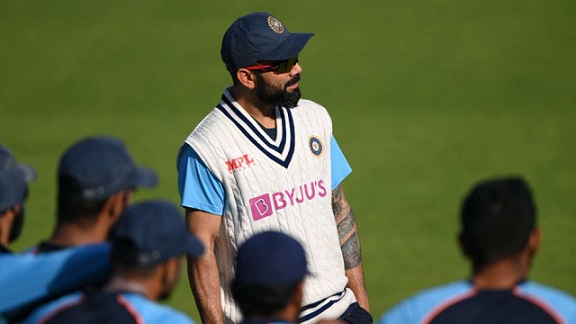




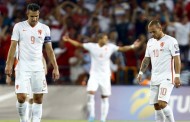
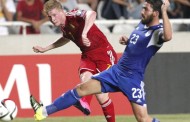
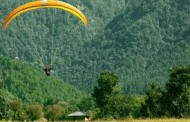
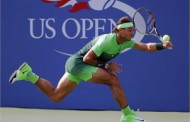
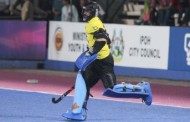
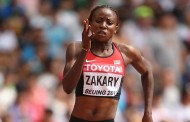
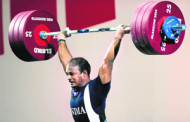
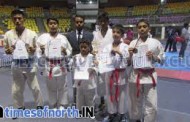
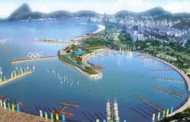
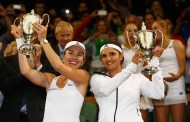





Recent Comments